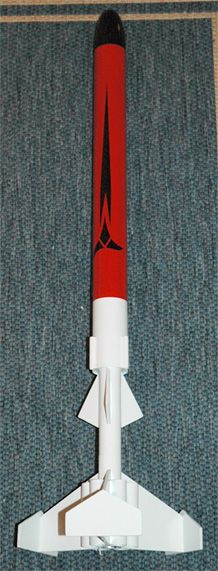Yoyodyne Aerospace Klingon Quantum Torpedo
Yoyodyne Aerospace - Klingon Quantum Torpedo {Kit}
Contributed by Joe Policy
| Construction Rating: | starstarstarstarstar_border |
| Flight Rating: | starstarstarstarstar |
| Overall Rating: | starstarstarstarstar_border |
| Manufacturer: | Yoyodyne Aerospace |
| Skill Level: | 3 |
| Style: | Futuristic/Exotic |
Brief:
The Yoyodyne Klingon Quantum Torpedo is a unique looking skill level 3 rocket
that is fun to fly. Designed by Dynosoar and purchased from the now defunct
Rebar Rocketry, this kit may be hard to come by these days.

Construction:
The parts list:
- 1 17" T60 body tube
- 1 17" T50 foil lined heavy wall body tube
- 6 T20, 2.75" long body tubes
- 1 PNC60 Nose Cone
- 1 T50 Engine Block
- 1 Motor Hook
- 2 50/60 fiber centering rings
- 3 3/16" launch lugs
- 1 Elastic shock cord
- 1 15" Mylar Parachute
- 1 Sheet balsa fin stock
- 1 Set of instructions
- 1 Decal, Water slide
The included instructions were very good and each step of construction is described in detail. There is even some humor added like the legal disclaimer which says, in part: "Don't do stupid stuff with this rocket". The only complaint I have is that the pictures were very washed out. Also, the instructions states that both the T50 and T60 tubes are 18". They are in fact only 17" long.
You start the build by roughing up inside of the T50 foil lined tube. This is so the glue on the engine block will have something to grab onto. The engine hook is mounted next. The instructions say to use a piece of cardstock glued over the hook to hold it in place. I almost skipped this step until I realized the engine hook would be external and will show on the completed rocket.
Centering rings are added to the T50 tube and a full 9" of the T50 slides up into the T60 tube leaving 8" exposed.
Fin patterns are included as well as a suggested layout for cutting out the various fin pieces. Unfortunately, the included sheet of balsa was not large enough to accommodate all of the parts, so I had to supply my own balsa. There are 3 upper fins and 3 lower ones with fin tips reminiscent of the FlisKits Triskelion.
Once the fins are mounted, you then add 6 tube fins. The tubes must be adjacent to the fins which will leave gaps between the tubes. The gaps are important because you must mount 3 launch lugs on the BT60 and you must carefully align the lugs with the gaps in the T20 tubes. Add the shock cord and parachute and the kit is complete!
Finishing:
The recommended paint scheme is slightly tricky. The instructions tell you use
white primer over the entire rocket. Next you put a 1" wide strip down the
center of the fin tips and paint the nose cone, motor tubes and fins silver.
You then mask off the top 1" and lower 3" of the T60 tube and add a
1" diameter circle cut from masking tape in the middle. You then paint the
exposed area fluorescent orange.
I went for a simpler scheme. After two coats of primer, I painted the nose cone black, most of the top section red and the rest is white. A single waterslide decal that looks like a Klingon emblem is added to finish off the rocket.
Construction Rating: 4 out of 5
Flight:
The face card that comes with the kit recommends either a D12-5 or E9-6. The
instruction sheet recommends D12-3, E9-6, and AT F21-8 motors.
I thought I would start with a D12-5. I added an adapter (not included or mentioned in the instructions) since the motor mount is designed for the longer "E" motors. I used 6 sheets of wadding to fill the T60 tube. First flight was fast and fairly straight but not a lot of altitude. Ejection was after apogee and deployment was no problem.
Second flight with the D12-3 was much better as ejection was right at apogee.
Last flight was with a E9-6, which was plenty of power to get this bird to some very respectable altitude. I lost site in the clouds so not sure when ejection occurred, but the rocket was recovered with no problems.
Recovery:
The included 15" Mylar parachute is a perfect match for this rocket. Even
with winds at 5-10 mph, there was little drift on the D motor flights and
recovery after the E motor flight was about 100 yards downrange. You needs lots
of wadding to protect the chute, I think dog barf would be a cheaper
alternative.
Flight Rating: 5 out of 5
Summary:
This rocket is a very unique design that stands out at a launch. Aside from
being short on balsa and the different engine recommendations between the face
card and the instructions, I would highly recommend this kit if you can get
your hands on one!
Overall Rating: 4 out of 5
 |
 |
Flights
 |
 |